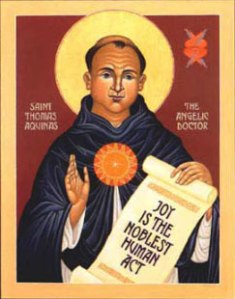Therefore I prayed, and understanding
was given me;
I called on God, and the spirit of wisdom came to me.
I preferred her to sceptres and thrones,
and I accounted wealth as nothing in comparison with her.
Neither did I liken to her any priceless gem,
because all gold is but a little sand in her sight,
and silver will be accounted as clay before her.
I loved her more than health and beauty,
and I chose to have her rather than light,
because her radiance never ceases.
All good things came to me along with her,
and in her hands uncounted wealth.
I rejoiced in them all, because wisdom leads them;
but I did not know that she was their mother.
I learned without guile and I impart without grudging;
I do not hide her wealth,
for it is an unfailing treasure for mortals;
those who get it obtain friendship with God,
commended for the gifts that come from instruction.
–Wisdom 7: 7-14
The Feast of St. Thomas Aquinas
Therefore I prayed, and understanding was given me;
I called for help, and the spirit of Wisdom came to me.
In the name of the living God: Father, Son and Holy Spirit.
Well good morning, good morning. And welcome to you as we celebrate the Feast of St. Thomas Aquinas.
It was a remarkable time in the history of Western culture. My brother Thomas was born in 1225 and died in 1274; he did not survive to see fifty years. But he lived during remarkable times. The Crusades had proven to be a miserable failure. The inquisition had begun recently in Toulouse, France, and Dante was writing his major works. Gothic architecture was beginning to take root. The institution of universities had only just begun to arise. Within 100 years, a remarkable period in European history we call the Renaissance would begin to flourish.
And coming largely from the east, a new wisdom began to spring up. The works of Aristotle, long lost in the West, had been recently translated into Latin. Many in the western Church had been openly hostile to this “new learning” because it was clearly pagan. And perhaps because people have “itchy ears” it was widely read and became a prominent philosophy of the time. And so, the notion began to swell that there were at least two kinds of truth. There was philosophical truth (or what we might call scientific truth), and then there was biblical truth. And it all depended on your point of view, you see, which you thought made more sense.
Onto this scene strides my brother, St. Thomas Aquinas. He did not initially seem like he would have much to offer the world. His fellow schoolmates called him “the dumb ox.” And yet his biographer, Gugliemo di Tocco, describes him as a man consumed by the holy mysteries of the great sacrament of the Eucharist, the sacrament in which we’ll soon share. The Italian term he used was divorato; Thomas was devoured by a sense of awe at this great mystery. But his intellect was also set aflame by the works of Aristotle.
From within that huge frame, within that dumb ox, shone one of the finest minds of his time, perhaps one of the finest minds of any time. And he was absolutely and mercilessly committed to knowing the truth; he thought that was one of our highest purposes as humans. And one of his investigations, his searches for the truth, is still widely taught and used today in seminaries and schools of philosophy. We call it The Summa Theologica.
And Thomas knew, through his confrontation of and dwelling within the divine mysteries, that God’s truth would surpass and could not be contained by human speech or knowledge. In John’s Gospel, Jesus promises to send us the Holy Spirit, the Spirit Jesus called the Spirit of Truth.
And among his many invaluable contributions, Thomas laid waste to the notion that there were many separate inconsistent truths, that there was philosophical truth and sacred truth. You see, back then, not unlike our day, many folks saw a contradiction between faith and reason. And there arose something called the doctrine of double truth: for example, that something might be true scientifically and false scripturally, and both of them could be correct. Thomas wrote that the truth that “human reason is naturally endowed to know cannot be opposed to the truth of the Christian faith.” The truth cannot be sequestered. Because all truth comes from God, who is Truth and in whom there is no deception, if there is an apparent contradiction between reason and faith we have either reasoned poorly or misunderstood the faith. But, he proclaimed adamantly, there is only one truth.
Thomas understood that the Wisdom of God, another name for Jesus as our Advent hymns remind us, came into the world. The Logos broke into the world that Christmas morning. There is a story that Thomas had a vision of Jesus on the Cross, and that Jesus said “Thomas, you have written well of me. What can I give you as your reward? And Thomas replied, “Lord, nothing but yourself.”
My brother Thomas wrote:
“Word made flesh, by Word He makes
True bread his flesh to be;
Man in wine Christ’s Blood partakes
And if his senses fail to see,
Faith alone the true heart wakes
To behold the mystery.”
In today’s Gospel, the Logos asks us “Have you understood all this?” But this wisdom, this divine truth, is to be felt and not just known, to be studied with the heart and not only the mind. This is a Truth, a wisdom, that is not so much about a problem that we figure out or an argument we can win, as it is about a person with whom we fall in love.
Amen.
James R. Dennis, O.P.
© 2014 James R. Dennis

